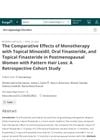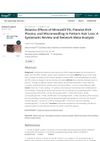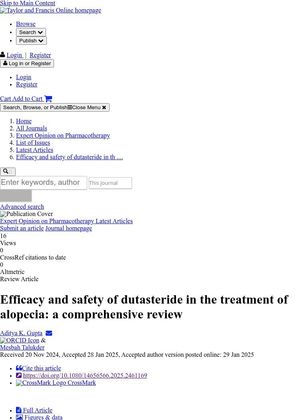 September 2024 in “Dermatology”
September 2024 in “Dermatology” Dutasteride works better than finasteride for hair loss and has mild, reversible side effects.
 May 2024 in “Journal of cosmetic dermatology”
May 2024 in “Journal of cosmetic dermatology” "Dutasteride 0.5 mg daily is the most effective treatment for male hair loss."
 February 2024 in “Actas Dermo-Sifiliográficas”
February 2024 in “Actas Dermo-Sifiliográficas” Dermatologists recommend oral dutasteride for male hair loss, low-dose oral minoxidil for female hair loss, and a multidisciplinary approach for young patients, with caution during pregnancy.
 January 2024 in “Journal of Cosmetic Dermatology”
January 2024 in “Journal of Cosmetic Dermatology” Smoking increases the risk of male pattern hair loss.
 January 2024 in “Skin appendage disorders”
January 2024 in “Skin appendage disorders” Oral finasteride seems more effective for hair loss in postmenopausal women, but more research is needed.
 August 2023 in “Journal of Dermatological Treatment”
August 2023 in “Journal of Dermatological Treatment” Mesotherapy might improve hair growth, but more research is needed to confirm its safety and effectiveness.
 June 2023 in “Journal of Cosmetic Dermatology”
June 2023 in “Journal of Cosmetic Dermatology” Finasteride 5mg daily is the most effective for female pattern hair loss, with higher doses of treatments generally more effective.
March 2023 in “JAAD case reports”  January 2023 in “Skin appendage disorders”
January 2023 in “Skin appendage disorders” Low-dose oral minoxidil may help treat hair loss but is not FDA-approved and can cause side effects like unwanted hair growth and heart issues.
 January 2023 in “Skin appendage disorders”
January 2023 in “Skin appendage disorders” Minoxidil, platelet-rich plasma, and microneedling all help with pattern hair loss, but their effectiveness varies.
 2 citations
,
October 2022 in “Journal of cosmetic dermatology”
2 citations
,
October 2022 in “Journal of cosmetic dermatology” CBD may increase hair growth, but the right concentration is crucial and more research is needed.
1 citations
,
August 2022 in “Journal of Dermatological Treatment” Dutasteride is the most effective for hair loss but may cause sexual and mental side effects.
1 citations
,
July 2022 in “JEADV Clinical Practice” New and existing treatments for hair loss show promise, with some being more effective for men and others for women.
 June 2022 in “Journal of The European Academy of Dermatology and Venereology”
June 2022 in “Journal of The European Academy of Dermatology and Venereology” Microneedling with topical dutasteride improves hair growth in men with hair loss and is safe to use.
 13 citations
,
February 2022 in “JAMA Dermatology”
13 citations
,
February 2022 in “JAMA Dermatology” Dutasteride is the most effective hair loss treatment after 24 weeks, but finasteride leads to the most hair growth after 48 weeks.
 2 citations
,
January 2022 in “Dermatologic Therapy”
2 citations
,
January 2022 in “Dermatologic Therapy” Natural products like saw palmetto, caffeine, melatonin, marine extracts, rosemary oil, procyanidin, pumpkin seed oil, and cannabidiol oil could potentially treat male hair loss.
2 citations
,
December 2021 in “Dermatology and therapy” Microneedling helps with hair loss, especially with 5% minoxidil, but more high-quality research is needed.
6 citations
,
October 2021 in “Brain Sciences” Dutasteride may help reduce brain inflammation and improve cognition.
20 citations
,
August 2021 in “Journal of Cosmetic Dermatology” Cannabinoids might help with skin diseases and hair growth, but more research is needed.
 4 citations
,
July 2021 in “Journal of Dermatological Treatment”
4 citations
,
July 2021 in “Journal of Dermatological Treatment” Finasteride helps hair growth but may cause sexual side effects and depression.
11 citations
,
March 2021 in “Cleveland Clinic Journal of Medicine” Treating hair loss in both men and women is effective and improves quality of life.
 40 citations
,
November 2020 in “JAMA Dermatology”
40 citations
,
November 2020 in “JAMA Dermatology” Finasteride may cause suicidal thoughts and mental side effects, especially in young people with hair loss.
 26 citations
,
February 2020 in “International Journal of Biological Macromolecules”
26 citations
,
February 2020 in “International Journal of Biological Macromolecules” Chitosan-coated dutasteride nanocapsules improve hair treatment, and physical stimulation boosts effectiveness.
 52 citations
,
January 2020 in “Scientific Reports”
52 citations
,
January 2020 in “Scientific Reports” NLCs with manual massage greatly improve clobetasol delivery to hair follicles.
 5 citations
,
January 2020 in “Skin appendage disorders”
5 citations
,
January 2020 in “Skin appendage disorders” Oral dutasteride works better for hair loss, but has more sexual side effects; intralesional dutasteride is a possible alternative.
 67 citations
,
April 2018 in “JAMA Dermatology”
67 citations
,
April 2018 in “JAMA Dermatology” Hair loss from hormone therapy in breast cancer patients can be improved with minoxidil treatment.
 33 citations
,
August 2016 in “Indian Journal of Dermatology, Venereology and Leprology”
33 citations
,
August 2016 in “Indian Journal of Dermatology, Venereology and Leprology” Dutasteride is more effective than finasteride at increasing hair count and reversing hair thinning in men with hair loss, but both have similar side effects.
 19 citations
,
January 2016 in “Annals of Dermatology”
19 citations
,
January 2016 in “Annals of Dermatology” Dutasteride is safe and effective for treating hair loss, but may decrease libido.
 77 citations
,
January 2015 in “International Journal of Biological Macromolecules”
77 citations
,
January 2015 in “International Journal of Biological Macromolecules” Chitosan nanoparticles improve minoxidil delivery to hair follicles for better alopecia treatment.
 97 citations
,
January 2014 in “Journal of The American Academy of Dermatology”
97 citations
,
January 2014 in “Journal of The American Academy of Dermatology” Dutasteride 0.5 mg works better than finasteride and placebo for increasing hair in men with hair loss.
 32 citations
,
January 2014 in “Indian Journal of Dermatology, Venereology and Leprology”
32 citations
,
January 2014 in “Indian Journal of Dermatology, Venereology and Leprology” Finasteride and dutasteride effectively stop or reverse hair loss in women with androgenetic alopecia, with dutasteride being more effective for women under 50.
 48 citations
,
September 2013 in “Oncologist”
48 citations
,
September 2013 in “Oncologist” Endocrine therapies for cancer significantly increase the risk of hair loss.
 17 citations
,
January 2013 in “Our Dermatology Online”
17 citations
,
January 2013 in “Our Dermatology Online” Dutasteride mesotherapy helps treat male hair loss but may harm sperm and sexual function.
 41 citations
,
April 2012 in “Journal of The European Academy of Dermatology and Venereology”
41 citations
,
April 2012 in “Journal of The European Academy of Dermatology and Venereology” Dutasteride-containing mesotherapy effectively treats female hair loss, improving density and thickness with minimal side effects.
 4 citations
,
May 2011 in “Current Drug Discovery Technologies”
4 citations
,
May 2011 in “Current Drug Discovery Technologies” A new liposomal system for applying dutasteride to the skin was developed, showing better skin absorption and stability, potentially improving treatment for hair loss.
 92 citations
,
June 2010 in “Journal of The American Academy of Dermatology”
92 citations
,
June 2010 in “Journal of The American Academy of Dermatology” Dutasteride 0.5 mg daily improves hair growth safely in men with hair loss.
 64 citations
,
June 2009 in “Journal of The American Academy of Dermatology”
64 citations
,
June 2009 in “Journal of The American Academy of Dermatology” Oral dutasteride can potentially treat frontal fibrosing alopecia in postmenopausal women, with some patients showing disease arrest and hair regrowth.
 195 citations
,
February 2007 in “The Journal of Clinical Endocrinology and Metabolism”
195 citations
,
February 2007 in “The Journal of Clinical Endocrinology and Metabolism” Dutasteride and finasteride may reduce sperm count and volume but don't affect movement or shape; effects are reversible after stopping.
 215 citations
,
November 2006 in “Journal of The American Academy of Dermatology”
215 citations
,
November 2006 in “Journal of The American Academy of Dermatology” Dutasteride more effective for hair growth, but has more side effects than finasteride.
 33 citations
,
October 2005 in “PubMed”
33 citations
,
October 2005 in “PubMed” Dutasteride successfully treated a woman's hair loss when other treatments failed.
20 citations
,
January 2004 in “PubMed” Dutasteride reduces DHT more than finasteride, but both drugs improve BPH symptoms similarly.
 165 citations
,
December 2002 in “Molecular and Cellular Endocrinology”
165 citations
,
December 2002 in “Molecular and Cellular Endocrinology” Male hormones, particularly DHT, are linked to male pattern hair loss, and treatments like finasteride can help, but they don't work for postmenopausal women's hair loss, which may have different causes.





































